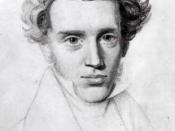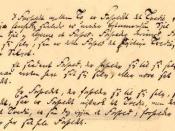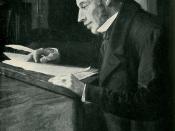Soren Kierkegaard was born in Copenhagen in 1813. He was often noted as the "Father of Existentialism" but was not famous for most of his life.
After being accepted into the University of Copenhagen in 1830, Kierkegaard realized that his philosophical theories did not fit into the mold of that time. "Kierkegaard recounts in his Journal that he led a dissolute life in his early student days and that, in doing so, he was rebelling both against his dominating father and against God."(Denise 172). Kierkegaard's father, Michael, who was a very religious man, led a extremely somber life and often suffered from depression, as he feared for the salvation of his soul. He taught Soren about Christianity, but mainly focused on the crucifixion of Christ. Kierkegaard once said concerning his father's teachings, "Even as a small child I was told, as solemnly as possible: that everyone spat at Christ who, indeed, was the truth, that the multitude, those who passed by, spat at him and said: 'Shame on you.'
I have kept this deep in my heart. This thought is my life." (Rohde) Although Soren inherited his father's melancholy and depression stricken personality, he was engaged to Regine Olson, the daughter of a prominent government official in 1840. Although he had fallen in love with her four years before they were engaged, it was an extremely short-lived interlude. Kierkegaard said his melancholy lifestyle was to blame:
... If I had not been a penitent, if I had not had my vita ante acta, if I had not had my depression --- marriage to her would have made me happier than I had ever dreamed of becoming. But being the person I unfortunately am, I must say that I could become happier in my
unhappiness without her than with her ---...


